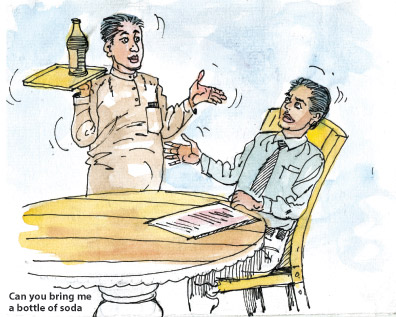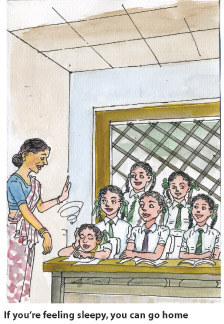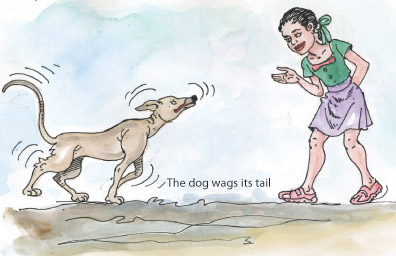|

Making requests using 'can' and 'could'
In our day-to-day transactions we have to ask people to do certain
things for us. For such requests we use 'can' and 'could.'
Can
We use 'can' for requests when we are talking to friends. We also use
it when we visit shops, restaurants, post offices and banks.
Can you give me 10 Rs 5 stamps? (Post Office)

Can you change this Rs 5,000 note? (Bank)
Can you bring me a bottle of soda? (Restaurant)
Can you move a bit, please? (Public transport)
Can you tell him that I am waiting here?
Can you lend me Rs 1,000?
As a modal verb, we use 'can'
to indicate ability.
I'm not feeling well, can you drive?
Sam can speak three languages
fluently.
Can your grandfather read this
letter?
The doctors are doing what they can, but the patient is still not out of
danger.
If you're feeling sleepy, you can go home.
Can you blame me for what you've done?
We use 'can' to ask for permission.
Can I use your computer?
You can park your vehicle here.
Can we postpone the test for another day?
We use 'can' to show possibility.
You can buy all your provisions from this grocery.
She can get very nasty at times.
Smoking can cause cancer and various other diseases.
Noise can be a serious problem if you're living in a city.
We use 'can' to offer help.
Can I help you with your studies?
Brian is not in. Can I be of any help?
Could
'Could' is more formal and polite than 'can.' We use 'could' when
talking to strangers, elderly people, teachers and superiors.
Excuse me, could you sign these papers?
Mr Soysa, could you lend me Rs 100?
I'm sorry to trouble you, but could you have an eye on my briefcase
while I get a cup of tea?
We use 'could' to give or
ask for permission.
Good morning Sir, could I have a word with you?

Excuse me, could I just add something to what you said?
When we make requests
'could' is more polite than 'can.'
Could you lend me your bicycle?
Could you switch off the lights when the work is over?
We use 'could' to express
possibility.
A lot of delays in public transport could be prevented.
Mahes could come at any time.
We use 'could' to make a
suggestion.
You could always call me.
We could go for a bath after work.
Activity
Use 'can' or 'could' in the blanks and check your answers with the
key.
1............. you open the door (Informal)
2............. you lend me a ruler? (Polite)
3............. you help me to do this sum? (Polite)
4.............you give me a receipt? (Informal)
5.............you tell me your name? (Polite)
6.............you pass me the salt, please? (Polite)
7............you press my shirt? (Informal)
8............you hold this bag for a minute? (Informal)
9.............you drive me to office? (Polite)
10............you tell me the time? (Polite)
<<<<<<<<<<<<>>>>>>>>>>>>>>-----
Key
1. Can
2. Could
3. Could
4. Can
5. Could
6. Could
7. Can
8. Can
9. Could
10. Could
<<<<<<<<<<<<>>>>>>>>>>>>>--------
How to use contractions
We form contractions or short forms with auxiliary verbs, 'be' verbs
and 'have.' Be familiar with the following contractions.
Contractions Meanings
1. I'm I am
2. I've I have

3. I'll I will
4. I'd I had / I would
5. you're you are
6. you've you have
7. you'll you will
8. you'd you had / you would
9. he's he is / he has
10. he'll he will
11. he'd he had / he would
12. she's she is / she has
13. she'll she will
14. she'd she had / she would
15. it's it is / it has
16. it'd it had / it would
17. we're we are
18. we've we have
19. we'll we will
20. we'd we had / we would
21. they're they are
22. they've they have
23. they'll they will
24. they'd they had / they would
25. there's there is / there has
26. there'll there will
27. there'd there had / there would
28. aren't are not
29. can't cannot
30. couldn't could not
31. didn't did not
32. doesn't does not
33. don't do not
34. hadn't had not
35. hasn't has not
36. haven't have not
37. isn't is not
38. mightn't might not
39. mustn't must not
40. needn't need not
41. oughtn't ought not
42. shan't shall not
43. shouldn't should not
44. wasn't was not
45. weren't were not
46. won't will not
47.wouldn't would not
Note
*It's means 'it is' It's mine.
*Its is possessive. The dog wags its tail.
*Am not is contracted as aren't. I am taller than you, aren't I?
*May not is normally not contracted.
Activity
Rewrite the following sentences using contractions. Check your
answers with the key.
1. You are quite right.
..............................
2. It is a difficult job.
..............................
3. I have met you before.
..............................
4. I do not know his name.
..............................
5. We have not decided to leave this house.
..............................
6. I am very happy about my results.
..............................
7. You need not do it.
..............................
8. It is not yet ready.
..............................
9. We will be meeting you at the airport.
..............................
10. Do not worry about me.
..............................
<<<<<<<<<<<<>>>>>>>>>
Key
1. You're quite right.
2. It's a difficult job.
3. I've met you before.
4. I don't know his name.
5. We haven't decided to leave this house.
6. I'm very happy about my results.
7. You needn't do it.
8. It's not yet ready.
9.We'll be meeting you at the airport.
10.Don't worry about me.
<<<<<<<<<<<<>>>>>>>>>
Form adverbs from :
Nouns
Words often come in families. You can expand your vocabulary by
becoming familiar with these word families. We give 25 nouns in Column
'A.' Write the relevant adverbs in Column 'B.' Check your answers with
the key.
Column A Column B
1. method .........................
2. militancy ........................
3. mind ..........................
4. minimum .........................
5. mistake .........................
6. moment ..........................
7. mood ...........................
8. morality ..........................
9. movement ...........................
10. murder ..........................
11. music ..........................
12. name ...........................
13. nation ...........................
14. nature ...........................
15. necessity ..........................
16. need ...........................
17. nervousness ...........................
18. newness ...........................
19. night ..........................
20. noise ...........................
21. normality ...........................
22. notice ...........................
23. obedience .........................
24. occasion ...........................
25.offence ...........................
<<<<<<<<<<<>>>>>>>>
Key
1. methodically 2. militantly 3. mindlessly
4. minimally 5. mistakenly 6. momentarily
7. moodily 8. morally 9. movingly
10. murderously 11. musically 12. namely
13. nationally 14. naturally 15. necessarily
16. needlessly 17. nervously 18. newly
19. nightly 20. noisily 21. normally
22. noticeably 23. obediently
24. occasionally 25. offensively |

